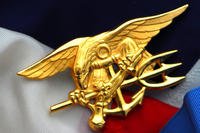PHOENIX – Just before 7 a.m. on a recent Saturday, the door to the Pettycrew Armory opened, and with some assistance, a young, smiling soldier seated in a wheelchair entered.
Dressed in his Army combat uniform, Spc. Rashaad Gregory was arriving for his Arizona National Guard drill weekend for the first time since he nearly died in a July 28 vehicle accident.
Gregory, an air conditioning and refrigeration repairer with the 3666th Support Maintenance Company here, defied medical expectations after a car accident caused his skull to tear away from his spine. This type of injury, referred to as an internal decapitation, typically results in death or paralysis, doctors said.
“The first time I went to see him, he was on complete life support, and the doctors were not optimistic at all,” said Army Lt. Col. Kenneth Stice, the 158th Combat Sustainment Support Battalion commanding officer and Gregory’s battalion commander. “With an internal decapitation like this, statistically, 99 percent of the people die on the scene.”
Gregory said doctors told him the actions of his friend and fellow Guardsman, Army Pfc. Edwin Carter, saved his life. Carter, who was driving when another vehicle slammed into theirs, stabilized Gregory’s head and neck until paramedics arrived.
Ken Gregory, Rashaad’s father, said the original prognosis from staff at St. Joseph’s Hospital and Medical Center wasn’t good; he was told his son would be a quadriplegic and be dependent on a ventilator for the rest of his life. But after successful surgeries to repair his internal injuries and fuse his spine and skull, Gregory started to make progress that led doctors to be more optimistic about his recovery.
Throughout his recovery, Gregory stayed positive. “[He] just never took ‘You can’t’ or ‘No’ for an answer,” Stice said. “His determination, spirit and desire to prove everyone wrong were awe-inspiring.”
During the almost four-month hospital stay, Gregory received a tremendous amount of support from his family and friends and his church and military communities.
“I wanted him to understand that the military is a family,” said Army Sgt. 1st Class Tiffany Fisher, the readiness noncommissioned officer for the 3666th Support Maintenance Company. “He was going to be treated like family, and he was going to be supported as if he was a family member.”
Gregory had only been a soldier for a short time, drilling twice with his unit before the accident occurred. His personality however, had made an impression on some of his fellow soldiers.
“He always had a smile on his face and a joke to tell,” Fisher said. “He’s just a happy kind of guy -- very positive [and] optimistic.”
Fisher said she believes Gregory’s optimism and positivity helped him recover.
“He was sitting in a hospital bed for almost four months, not being able to move, and I never heard a negative word come out of his mouth,” she said.
While he was in the hospital Gregory’s unit promoted him from private first class to specialist. The military was a huge focus point in Gregory’s recovery process, Fisher said.
“When he knew he was getting out of that hospital, all we had to do is make sure his uniform was ready,” she added, “because he wanted to walk out in that uniform.”
On Nov. 15, that’s exactly what Gregory did -- dressed in his Army uniform, with a walker for assistance and his father by his side. “My family, my dad, my sisters, my brother and my girlfriend were there for me throughout this,” he said.
“It’s easier to believe in yourself when you have someone there believing in you,” Gregory said. “I would not have been able to do as much as I have without my family and my friends. They are the source of my strength.”
Gregory still has a long road to full recovery, but he’s working hard and staying positive.
“I made a comment to him on my second visit,” Stice said. “I said we’re all dealt bad hands as we go on in life. How you play the hand is up to you. The next time I saw him, he said ‘Sir, I turned that horrible hand into a royal flush.’ And I have to agree, he has.”

























